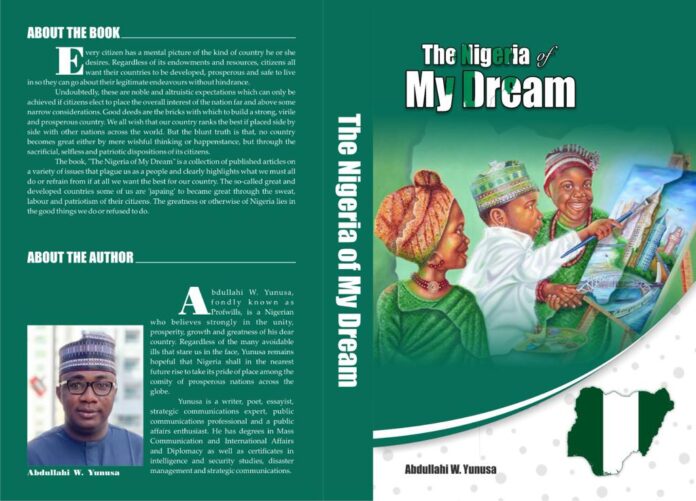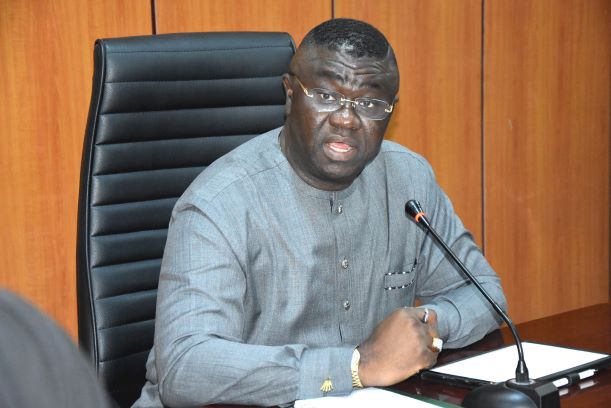The Nigeria of My Dream: An X-Ray of Abdullahi Yunusa’s Visionary Book, by Abdullahi Haruna Haruspice

The Nigeria of My Dream: An X-Ray of Abdullahi Yunusa’s Visionary Book, by Abdullahi Haruna Haruspice
In “The Nigeria of My Dream,” a book written by ace journalist, communication strategist and puclicist Abdullahi W. Yunusa, provides a compelling analysis of the current state of Nigeria, and offers thought-provoking solutions to the country’s socio-economic challenges. The book is a complete encyclopaedia of the Nigerian situation in the last one and a half decades, addressing the country’s persistent security challenges, economic crises, chaotic politics, social disorder, and the tendency for some Nigerian leaders and their followers to be too religious in public eye without necessarily fearing God in their conduct and treatment of fellow citizens.
The author takes the reader on a journey through Nigeria’s early years, highlighting the country’s vast arable lands, good weather, and climate, cash crops like cocoa, groundnut, rubber, gold, iron ore, bitumen, and abundant oil and gas deposits that made it the pride of Africa in terms of its economy. Nigeria was on the same level of development or even better placed than countries like Singapore, Malaysia, Brazil, Indonesia, India, United Arab Emirates, South Africa, and others. However, years of misrule, mismanagement, and nepotism perpetrated by successive leaders and the conspiratorial silence of docile masses who have been programmed and manipulated into ethnic and religious division, have kept the nation down.
The book addresses the leadership recruitment process and suggests that it must be amended to stop throwing up ill-equipped, unprepared, and incompetent leaders. The author calls for the production of vibrant, experienced, well-prepared leaders who not only have the ambition to serve but also the pedigree to show for what they have done in the past and who can replicate their success stories in the area of advocacy, entrepreneurship, philanthropy or any personal accomplishment, in governance.
In his writing, Abdullahi W. Yunusa maintains a positive mindset and never gives up on the nation. He insists that talking about problems without recommending solutions is a waste of valuable time. The most reliable place to find thought-provoking solutions to Nigeria’s myriad of socio-economic challenges is the book itself.
The linguistic style adopted by Abdullahi W. Yunusa in “The Nigeria of My Dream” is a mixture of formal and persuasive language. The author uses a range of rhetorical strategies to convey his message, including anecdotes, historical references, and statistics. The language is often emotive and impassioned, with the author expressing a clear sense of frustration and disappointment with Nigeria’s current state of affairs. However, the tone is never pessimistic or defeatist, and the author maintains a hopeful and positive outlook throughout the book.
The author also employs a range of literary devices to enhance his writing, including metaphors, similes, and allusions. For example, in describing Nigeria’s past, the author states that “Nigeria was on the same level of development or even better placed than countries like Singapore, Malaysia, Brazil, Indonesia, India, United Arab Emirates, South Africa, and others.” This comparison helps to underscore the scale of Nigeria’s decline and the potential for it to regain its former position.
Another notable feature of the author’s linguistic style is his use of concrete examples to support his arguments. For instance, he cites specific individuals who have made significant contributions to Nigeria’s development, such as Aliko Dangote and Fela Anikulapo-Kuti. These examples help to make the author’s points more tangible and relatable to readers.
In terms of organization, the book is well-structured, with each chapter focusing on a specific aspect of Nigeria’s socio-economic challenges. The author presents a clear and logical argument throughout, building on each chapter to arrive at his final conclusions and recommendations. The writing is also clear and concise, with the author avoiding overly complex language or jargon that might detract from the book’s accessibility.
The linguistic style adopted by Abdullahi W. Yunusa in “The Nigeria of My Dream” is highly effective in conveying his message and engaging readers. The author’s use of persuasive language, concrete examples, and literary devices help to bring his arguments to life and make them more compelling. The book is an excellent example of how skilled writing can be used to inspire change and make a difference in society.
The book is not only a critique of Nigeria’s present state but also a celebration of its past and present trailblazers. The author takes his time to tell the impactful stories of certain dramatis personae, dead and alive, in the story of Nigeria who have gone beyond the ordinary to put the country and humanity first in the course of their remarkable lives. It is difficult, if not impossible, for youngsters to read the amazing stories of these individuals and not be inspired to want to rise beyond the average.
Overall, “The Nigeria of My Dream” is a must-read for anyone interested in understanding Nigeria’s past, present, and future. The book offers practical solutions to Nigeria’s problems and inspires readers to believe that change is possible. Students, scholars, historians, tourists, and researchers will also benefit from the depth of the author’s thoughts, his clarity of mind, and lucid presentation as obvious in the book’s coming pages.
Abdullahi Haruna Haruspice, a public commentator and social media influencer is a brother to the Editor









